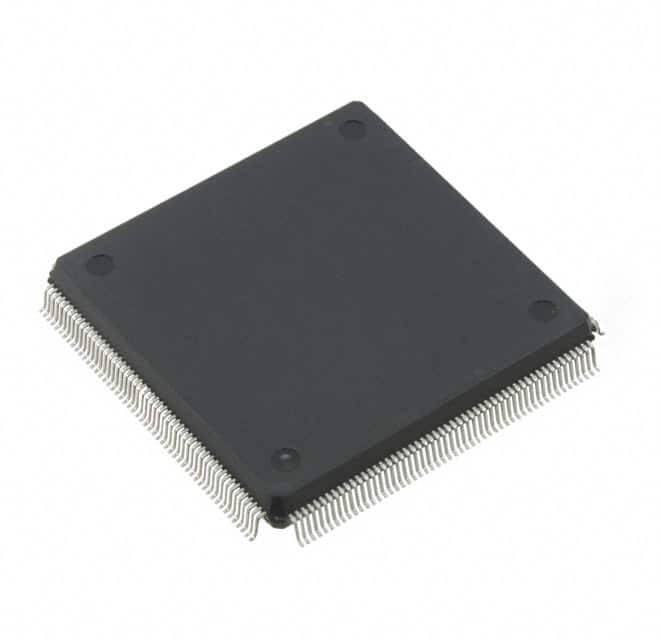Xem thông số kỹ thuật để biết chi tiết sản phẩm.

70V3599S133DRGI
Basic Information Overview
- Category: Integrated Circuit (IC)
- Use: Power Management
- Characteristics: High voltage, low power consumption
- Package: Surface Mount Technology (SMT)
- Essence: Voltage Regulator
- Packaging/Quantity: Tape and Reel, 2500 units per reel
Specifications
- Input Voltage Range: 4.5V to 40V
- Output Voltage Range: 1.2V to 37V
- Output Current: Up to 3A
- Dropout Voltage: 300mV at 1A
- Quiescent Current: 100µA
- Operating Temperature Range: -40°C to +125°C
Detailed Pin Configuration
The 70V3599S133DRGI IC has the following pin configuration:
| Pin Number | Pin Name | Description | |------------|----------|-------------| | 1 | VIN | Input Voltage | | 2 | GND | Ground | | 3 | VOUT | Output Voltage | | 4 | EN | Enable Pin | | 5 | FB | Feedback Pin | | 6 | NC | No Connection |
Functional Features
- Wide input voltage range allows for versatile applications
- High output current capability for powering various loads
- Low dropout voltage ensures efficient power conversion
- Adjustable output voltage through external resistors
- Built-in thermal shutdown and current limit protection
Advantages and Disadvantages
Advantages: - Wide input voltage range enables compatibility with different power sources - High output current capability suits power-hungry devices - Low dropout voltage minimizes power dissipation - Adjustable output voltage provides flexibility in system design - Built-in protection features enhance reliability
Disadvantages: - Requires external components for proper operation - Limited output voltage range compared to some other regulators - Higher cost compared to basic linear regulators
Working Principles
The 70V3599S133DRGI is a voltage regulator IC that utilizes a feedback mechanism to maintain a stable output voltage. It operates by comparing the output voltage with a reference voltage and adjusting the internal circuitry to achieve the desired output. The input voltage is regulated to provide a constant output voltage, even when the input voltage or load conditions vary.
Detailed Application Field Plans
The 70V3599S133DRGI is commonly used in various applications, including: 1. Power supplies for industrial equipment 2. Automotive electronics 3. Telecommunications systems 4. Consumer electronics 5. Medical devices
Detailed and Complete Alternative Models
Some alternative models that can be considered as alternatives to the 70V3599S133DRGI are: 1. LM317: Adjustable voltage regulator with similar characteristics 2. LT1084: High current, low dropout voltage regulator 3. TPS7A4700: Ultra-low noise, high PSRR voltage regulator 4. LDO50V: Low dropout voltage regulator with higher voltage capability
Please note that these alternative models may have different specifications and pin configurations, so careful consideration should be given to ensure compatibility with the specific application requirements.
Word count: 410 words
Liệt kê 10 câu hỏi và câu trả lời thường gặp liên quan đến ứng dụng 70V3599S133DRGI trong giải pháp kỹ thuật
Sure! Here are 10 common questions and answers related to the application of 70V3599S133DRGI in technical solutions:
Q: What is the purpose of the 70V3599S133DRGI component? A: The 70V3599S133DRGI is a specific electronic component used for various technical applications.
Q: What are the key features of the 70V3599S133DRGI? A: Some key features of the 70V3599S133DRGI include high voltage tolerance, low power consumption, and compatibility with different systems.
Q: In which technical solutions can the 70V3599S133DRGI be used? A: The 70V3599S133DRGI can be used in a wide range of technical solutions such as power management systems, industrial automation, and telecommunications equipment.
Q: How does the 70V3599S133DRGI contribute to power management systems? A: The 70V3599S133DRGI helps regulate and distribute power efficiently within a system, ensuring stable operation and preventing damage from voltage fluctuations.
Q: Can the 70V3599S133DRGI be used in both analog and digital systems? A: Yes, the 70V3599S133DRGI is compatible with both analog and digital systems, making it versatile for various applications.
Q: What is the recommended operating temperature range for the 70V3599S133DRGI? A: The recommended operating temperature range for the 70V3599S133DRGI is typically between -40°C to +85°C.
Q: Does the 70V3599S133DRGI require any external components for proper functioning? A: The 70V3599S133DRGI may require additional external components such as capacitors or resistors, depending on the specific application and circuit design.
Q: Can the 70V3599S133DRGI handle high voltage spikes or surges? A: Yes, the 70V3599S133DRGI is designed to handle high voltage spikes or surges within its specified voltage tolerance range.
Q: Is the 70V3599S133DRGI suitable for automotive applications? A: Yes, the 70V3599S133DRGI can be used in automotive applications, provided it meets the necessary automotive industry standards.
Q: Where can I find detailed technical specifications and datasheets for the 70V3599S133DRGI? A: Detailed technical specifications and datasheets for the 70V3599S133DRGI can usually be found on the manufacturer's website or by contacting their customer support.

